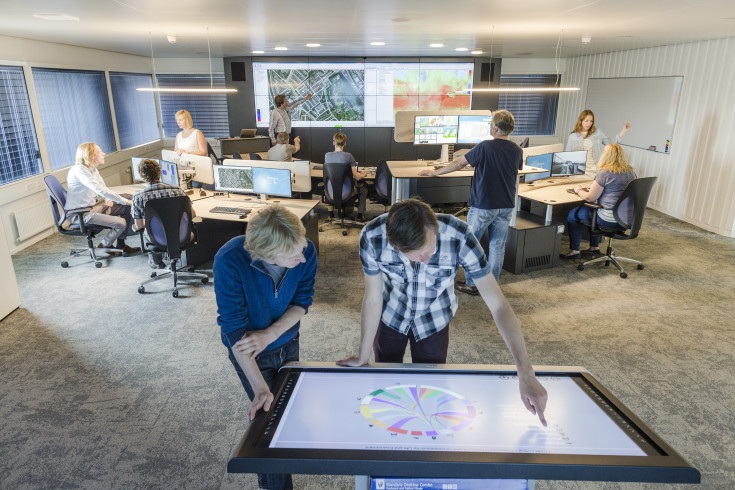iD-Lab: machine learning for fast, real-time insights
With our iD-Lab, we provide policy- and decision-makers in the water world with the option of identifying flood and drought risks, in both real-time and ten days into the future. We have data sources and visualisation capabilities at our disposal for this purpose, and machine learning and data science make hybrid modelling possible. The insights help water authorities, governments, insurers and companies in the logistics sector to take important decisions and actions to reduce or prevent the impact of extreme weather events.
Drawing on existing, more traditional, hydrological models, our experts simulate, among other things, how much water will flow through the Rhine and what the water level will be. It is not possible to prevent droughts or floods in this way, but the appropriate action can be taken in good time. This can significantly reduce the impact of extreme weather events on places where people live around the world.
We do the calculations in our interactive data research laboratory, which has a crisis room in addition to the room where we conduct experiments. This experimentation room offers policymakers a robust working approach. For example, when we provide Rijkswaterstaat (the Dutch Directorate General for Public Works and Water Management) with urgent advice.
Our iD-Lab brings together models, data, visualisation techniques and knowledge that can also be used in crisis situations. The visual presentation of the data also help to take the right decisions. The crisis room supports expert advisers of external parties in crisis situations. In practice, these are experts, crisis managers and decision makers from Rijkswaterstaat/the Netherlands Water Management Centre (WMCN)
More and more data available that can be properly processed
The iD-Lab has an ever-increasing amount of data at its disposal due to the major expansion of data from satellites, all sorts of sensors, such as sensors in planes, and phones. Researchers at the iD-Lab can combine the available data with science techniques such as machine learning. This makes it possible to calculate and understand complex physical processes, which is not possible with traditional modelling. Or you can speed up some calculations enormously.
‘You can do a lot of computing with machine learning,’ explains Gert-Jan Schotmeijer. ‘AI is still not widely used in the world of water but we are experimenting with it a lot. Using the right technologies, you can build models and calculate whether water levels will be lower or higher. That is much faster and it works well for short-term forecasts. Even so, traditional modelling continues to be the more sensible option for longer-term forecasts looking ten days ahead, for example. They are more accurate.’
When should we dredge in fairways? Machine learning provides the answer
Another example of where machine learning can speed up a process involves questions from port managers about dredging in fairways. The approach here is to look at whether or not silt suspended in the water will sink to the bed. The next decision is about whether to dredge, or to deposit gravel in some locations. That requires calculations.
‘We can’t properly capture some physical processes in formulas at present,’ says Gert-Jan. ‘With machine learning, you could do that by simulating the processes on the basis of data. You can let the computer calculate those formulae itself and provide port operators with the answers to their questions.’

Conventional modelling, machine learning or hybrid?
Although machine learning has taken off, you can’t use it for everything. It’s not a silver bullet. So the iD-Lab not only explores the possibilities; it also uses its knowledge to determine the limits: machine learning may be less accurate over longer periods, for example.
With this type of research, the iD-Lab drives the data innovation process. That is our signature. In this way, we help policy- and decision-makers to make well-founded decisions by providing advice quickly: as conventional modelling, with machine learning or in a hybrid form.
Crisis room and experimentation room available for decision-makers
In our lab, we provide decision-makers and experts with a physical space during crisis situations. Or we host them so they can experiment with data that tap into innovative potential.
At other times, Deltares staff with the relevant expertise can be brought in to provide advice. The lab is also available for training purposes, for example in machine learning, and co-creation in research.
‘We have been involved in research for decades looking at how to use different types of data to make forecasts and advise on measures. In that sense, data science is nothing new for us. What is new is that you can now do much more with it and there are more options in terms of the scale on which you apply the data,' according to Gert-Jan Schotmeijer

